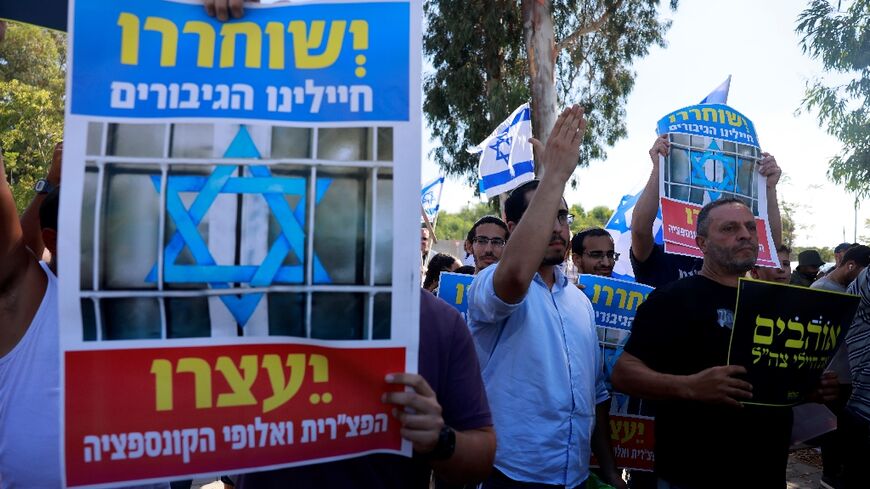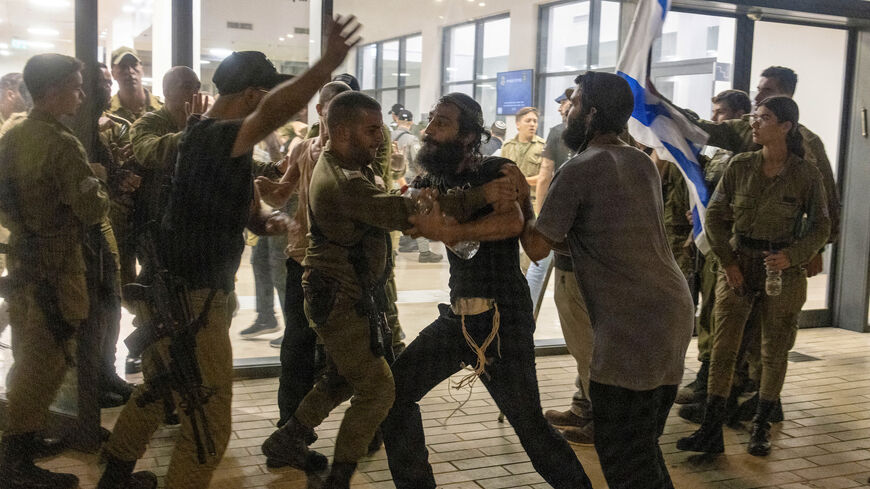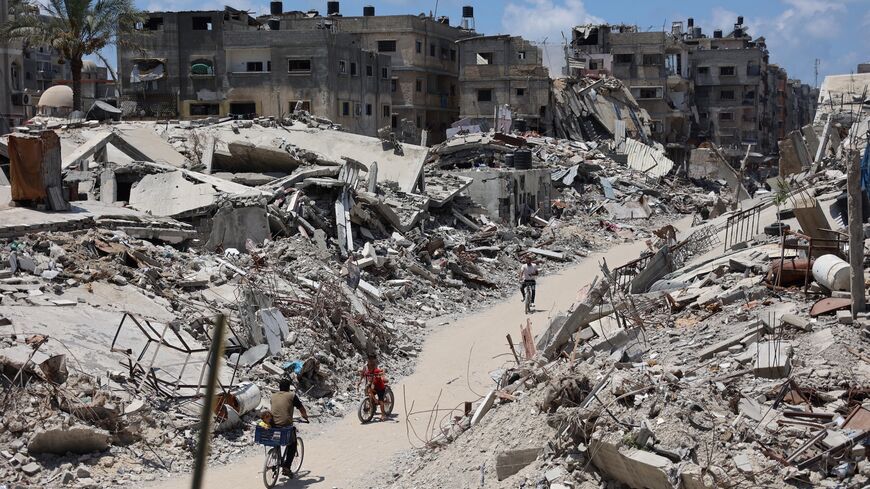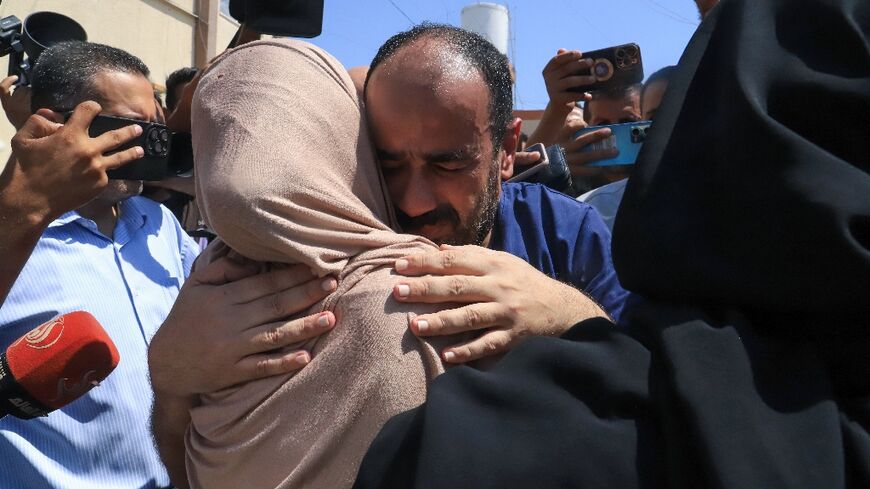Sexual assault, torture among accusations against 9 Israeli soldiers who guarded Hamas militants
The Israeli military prosecution says the nine were involved in attacking sexually and torturing a Gaza Hamas assailant imprisoned at the Sde Teiman detention facility.

An Israeli military court is set to prolong on Tuesday the detention of nine reserve soldiers on suspicion of sexually attacking a Hamas assailant imprisoned in Israel, as an advisory committee criticized the detention conditions of hundreds of Hamas attackers caught on Oct. 7 and afterward.
Dozens of people gathered outside the military court at the Beit Lid army base on Tuesday morning before the hearing started, violently protesting and rioting against the detention of the suspects and blaming the military prosecution for allegedly protecting Hamas assailants instead of protecting Israeli soldiers. Large forces of the military and police are at the site.
Accusations against the reserve soldiers
The nine reserve soldiers detained are suspected of the sexual assault and torture of a Hamas assailant who had served as a battalion commander in Gaza. Haaretz said Tuesday it obtained medical reports stating that the detainee suffered a ruptured intestine, severe injuries to the anus and lungs, and broken ribs, and was taken to a hospital for surgery on July 5. The military prosecution suspects that the nine reserve soldiers, including an officer in charge of security at the base, attacked the detainee or allowed the attack to take place.
On July 8, Israel’s public broadcaster Kan revealed that three soldiers had been detained at the beginning of June after their commanders suspected that some Palestinian prisoners were beaten during their transfer by bus from the Sde Teiman military base and detention center to a security interrogation facility. Two of the three were later released, while the third remains in detention. The military prosecution intends to charge him for the beating of four prisoners while they were handcuffed and blindfolded.
Arrests of suspects generate riots
Having investigated the allegations against the nine for more than two weeks, representatives of the military prosecution arrived at Sde Teiman to detain them for questioning. It is unclear whether the representatives arrived wearing masks or put on masks once inside. News of the imminent detention quickly spread on social media. As a result, dozens of activists and several Knesset members arrived at the site and entered the army base violently.
After the riots at Sde Teiman, other far-right activists stormed the Beit Lid army base where the nine suspects were transferred for investigation and where the offices of the military prosecution are located. Here as well, the protesters forced their way into the base and into the buildings.
Prime Minister Benjamin Netanyahu and Defense Minister Yoav Gallant slammed the entry by force into the army bases, with Gallant asking Netanyahu to punish not only the activists but also the Knesset members involved.
CNN publishes report on dire imprisonment conditions
The Sde Teiman military base was tasked after the Oct. 7 attack with housing hundreds of Hamas assailants captured that day and in the days that followed. Prisoners are held at the base until Israeli authorities decide whether they are to be charged. If charged, they are transferred from Sde Teiman to an Israeli civil jail. If not, they are transferred back to the Gaza Strip. The maximal period of imprisonment at Sde Teiman, before a decision is made and without charges submitted, is 45 days.
But a report by CNN published at the beginning of May claimed the prisoners were held in terrible conditions and suffered from attacks and even torture by soldiers guarding them. The report was based on information CNN received from what it called "three Israeli whistleblowers." One of the sources was quoted as saying that "we were told they were not allowed to move. They should sit upright. They’re not allowed to talk. Not allowed to peek under their blindfold." A second source said that "they (the guards at the medical clinic inside Sde Teiman) stripped them down of anything that resembles human beings." The third source was quoted as saying that "[the beatings] were not done to gather intelligence. They were done out of revenge."
A report published by The New York Times at the beginning of June similarly described the terrible conditions of incarceration. "The men sat in rows, handcuffed and blindfolded, unable to see the Israeli soldiers who stood watch over them from the other side of a mesh fence. They were barred from talking more loudly than a murmur, and forbidden to stand or sleep except when authorized," said the New York Times report, adding that the prisoners were "forbidden to stand or sleep except when authorized."
Advisory committee criticizes imprisonment conditions
Following the reports by CNN and The New York Times, Israeli human rights groups petitioned to the Supreme Court, demanding to improve incarceration conditions of the prisoners. In a hearing held at the court on June 5, government representatives admitted that Sde Teiman was a makeshift solution, adding that it had opened a new detention facility inside the Ofer military camp and that 500 prisoners currently in Sde Teiman would be transferred there, to be incarcerated under better conditions.
In parallel, Gallant called at the end of May for the establishment of an advisory committee to inspect the detention conditions of Sde Teiman.
On July 18, government officials informed the Supreme Court that Netanyahu had instructed that better solutions be found for the Gaza Palestinians still held in Sde Teiman, namely new detention facilities. The officials also noted that National Security Minister Itamar Ben-Gvir refuses to imprison the detainees in the civil jails under his responsibility.
Attorney General Gali Baharav-Miara sent an official letter to Netanyahu last week, warning that "if the detention facility is not quickly rehabilitated to serve the way it was supposed to originally, there would be extensive implications." She also accused the National Security Ministry of "blocking attempts to implement necessary solutions."
The advisory committee handed Gallant its conclusions on Tuesday, criticizing the detention conditions. The committee said that while the maximal time of imprisonment in Sde Teiman was set for 45 days, the intention was to keep them there no longer than two weeks, until a decision was made on charging them. Instead, many detainees were held there for long periods, including in sheds originally intended for the parking of tanks. The committee recommended that all the remaining detainees be transferred immediately to Israeli jails.







